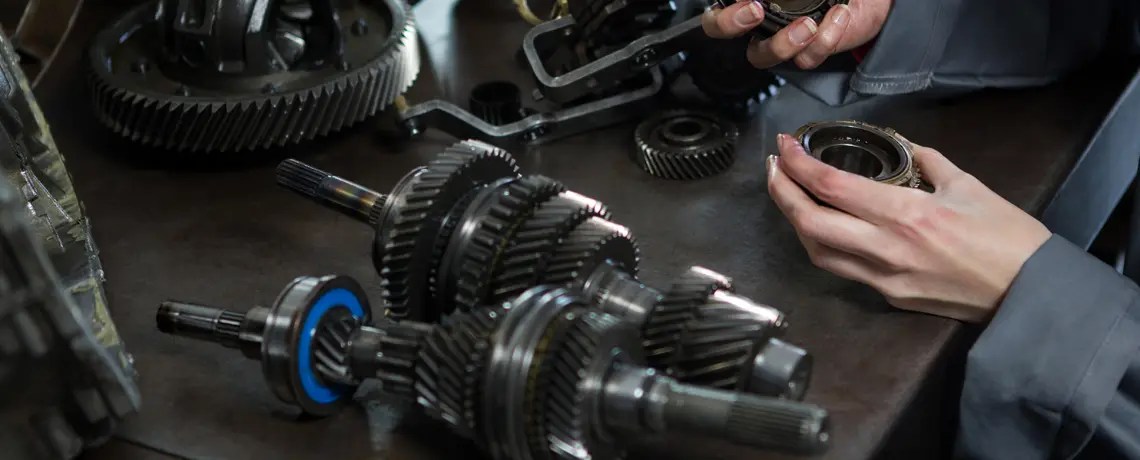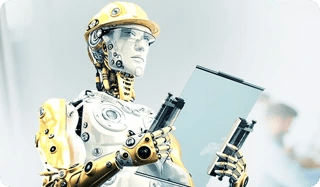Explore the Dynamics of Design with Mechanical Engineering Syllabus

Look around, and you will find yourself surrounded by stuff that has come into existence without the intervention or implementation of mechanical engineering. It is present in almost all aspects of our lives. Mechanical engineers are professionals skilled in designing, testing and hence improving mechanical systems. There is always a lack and hunt for skilled professionals.
Industries, including manufacturing, automotive, aerospace, and energy, continually rely on mechanical engineers to design, analyze, and enhance mechanical systems. According to a report by the Bureau of Labor Statistics, the employment rate for mechanical engineers is going to see a growth of 10% from the year 2022 to 2023. This is much faster than all the other occupations. You can see around 19,000 openings for mechanical engineers every year during this decade.
Therefore, this field brings a great opportunity to the students who are willing to make their career in mechanics. And the best time to kickstart your career is just after your intermediate. Grab a seat in B.Tech in Mechanical Engineering.
B.Tech in Mechanical Engineering Eligibility
This programe is ideal for those aiming to pursue careers in mechanical engineering design and manufacturing. Applicants should have a foundational understanding of basic mechanics and must have completed their higher secondary education with at least 60% marks in Physics, Chemistry, and Mathematics.
B.Tech in Mechanical Engineering Syllabus
| Semester 1 | Semester 2 |
|---|---|
|
|
| Semester 3 | Semester 4 |
|---|---|
|
|
| Semester 5 | Semester 6 |
|---|---|
|
|
| Semester 7 | Semester 8 |
|---|---|
|
|
|
Different Types of Mechanical Engineering
- Acoustics
- Aerospace
- Automation
- Automotive
- Autonomous Systems
- Biotechnology
- Composites
- Computer-Aided Design (CAD)
What Can I do after B.Tech in Mechanical Engineering?
You have got ample options once you complete your 4-year B. Tech course in Mechanical Engineering.
Post Graduation-, M.Tech In ME
Pursuing a postgraduate degree in mechanical engineering or any related engineering field allows students to deepen their subject knowledge, particularly in specialised areas. This advanced understanding can enhance future job opportunities and provide a pathway to careers in research, including the potential to pursue a Ph.D. and work as an engineering scientist.
Government Jobs
Government entities such as DRDO, the Ministry of Defence, IITs, IISc, national research laboratories, and various state departments offer positions for mechanical engineers. Graduates can apply for these roles by meeting the necessary qualifications. However While securing these positions can be challenging for newcomers, yet it is achievable with demonstrated capability.
Private Technical Jobs
This is typically the most popular choice for many engineering graduates. They secure positions with major companies, either through campus placements or individual applicationsby applying independently. Many engineering graduates receive lucrative salary packages and are offered prominent roles due to the high demand for their skills. Currently, engineering is one of the few professions that is both highly promising and profitable.
Non-core Jobs
An engineering graduate is not restricted to working solely in engineering-related roles or companies. Throughout their education, they acquire valuable skills such as data analysis, interpretation, and strong aptitude abilities. These skills are often highly sought after by top companies, leading to opportunities in roles such as Analyst, Technical Advisor, and more.
To Cut it Short
While society becomes more modernised there is a consistent growth in job opportunities for mechanical engineers continue to grow steadily as society becomes more modernised, it’s clear that this field holds great promise for the future. Mechanical engineers play a crucial role in driving innovation and design, as well as in the development and improvement of mechanical systems that sustain and transform communities and economies.
Join B.Tech in Mechanical Engineering at Mahindra University for a well-rounded academic background, complemented with by internships, cooperative education programmes, research projects, summer employment, and industry exposure, which can significantly enhance the prospects of becoming a successful professional in mechanical engineering.
FAQs
- What are the subjects in mechanical engineering?
- Mathematics and Calculus.
- Thermodynamics.
- Fluid Mechanics.
- Mechanics of Materials.
- Materials Science.
- Engineering Graphics and CAD.
- Mechatronics.
- Engineering Thermodynamics.
- Is mechanical engineering tough or not?
Yes, mechanical engineering is considered a challenging discipline because approximately 90% of the coursework involves numerical-based questions.
- Is mechanical harder than CSE?
It depends on your strengths. If you have a knack for visualising 3D spaces, then mechanical engineering (or even architecture) might be easier for you. On the other hand, if you excel in logic, can break down complex tasks into smaller ones, or think algorithmically, then computer science might be a better fit.


















































































































































































































![Arm_Yourself_with_Deep_Business_Knowledge_&_Insights_with_PhD_Program_in_Business_Administration_at_Mahindra_University[1] Arm_Yourself_with_Deep_Business_Knowledge_&_Insights_with_PhD_Program_in_Business_Administration_at_Mahindra_University[1]](https://i0.wp.com/www.mahindrauniversity.edu.in/wp-content/uploads/2023/04/Arm_Yourself_with_Deep_Business_Knowledge__Insights_with_PhD_Program_in_Business_Administration_at_Mahindra_University1.jpg?resize=1140%2C460&ssl=1)
![Emerge_as_a_Forward_thinking_Mechanical_Engineer_with_B_1140x460[1] Emerge_as_a_Forward_thinking_Mechanical_Engineer_with_B_1140x460[1]](https://i0.wp.com/www.mahindrauniversity.edu.in/wp-content/uploads/2023/04/Emerge_as_a_Forward_thinking_Mechanical_Engineer_with_B_1140x4601.jpg?resize=1140%2C460&ssl=1)
![B.Tech_in_Computer_Science_Engineering_(BTech_CSE)_Your_Gateway_to_Become_a_Computer_Genius_1140x460[1] B.Tech_in_Computer_Science_Engineering_(BTech_CSE)_Your_Gateway_to_Become_a_Computer_Genius_1140x460[1]](https://i0.wp.com/www.mahindrauniversity.edu.in/wp-content/uploads/2023/04/B.Tech_in_Computer_Science_Engineering_BTech_CSE_Your_Gateway_to_Become_a_Computer_Genius_1140x4601.jpg?resize=1140%2C460&ssl=1)
![Digital_Marketing_is_Booming_Globally_1140x460[1] Digital_Marketing_is_Booming_Globally_1140x460[1]](https://i0.wp.com/www.mahindrauniversity.edu.in/wp-content/uploads/2023/04/Digital_Marketing_is_Booming_Globally_1140x4601.jpg?resize=1140%2C460&ssl=1)
![MU_Electrical20Computer20Engineering_1140x460[1] MU_Electrical20Computer20Engineering_1140x460[1]](https://i0.wp.com/www.mahindrauniversity.edu.in/wp-content/uploads/2023/04/MU_Electrical20Computer20Engineering_1140x4601.jpg?resize=1140%2C460&ssl=1)
![BA_LLB_Hons_Course_at_Mahindra_University[1] BA_LLB_Hons_Course_at_Mahindra_University[1]](https://i0.wp.com/www.mahindrauniversity.edu.in/wp-content/uploads/2023/04/BA_LLB_Hons_Course_at_Mahindra_University1.webp?resize=1140%2C460&ssl=1)
![Management_&_Business_Administration_is_Tremendously_High[1] Management_&_Business_Administration_is_Tremendously_High[1]](https://i0.wp.com/www.mahindrauniversity.edu.in/wp-content/uploads/2023/04/Management__Business_Administration_is_Tremendously_High1.jpg?resize=1140%2C460&ssl=1)

![whyistraining&placementcellimportant[1] whyistraining&placementcellimportant[1]](https://i0.wp.com/www.mahindrauniversity.edu.in/wp-content/uploads/2023/04/why20is20training2020placement20cell20important1.png?resize=1140%2C460&ssl=1)
![TheDifferencesbetweenRights&Duties[1] TheDifferencesbetweenRights&Duties[1]](https://i0.wp.com/www.mahindrauniversity.edu.in/wp-content/uploads/2023/04/The20Differences20between20Rights2020Duties1.png?resize=1140%2C460&ssl=1)
![sleep_deprivation[1] sleep_deprivation[1]](https://i0.wp.com/www.mahindrauniversity.edu.in/wp-content/uploads/2023/04/sleep_deprivation1.jpg?resize=1140%2C460&ssl=1)
![SelfLoveBlogImage2[1] SelfLoveBlogImage2[1]](https://i0.wp.com/www.mahindrauniversity.edu.in/wp-content/uploads/2023/04/Self20Love20Blog20Image2021.png?resize=1140%2C460&ssl=1)


























































































































